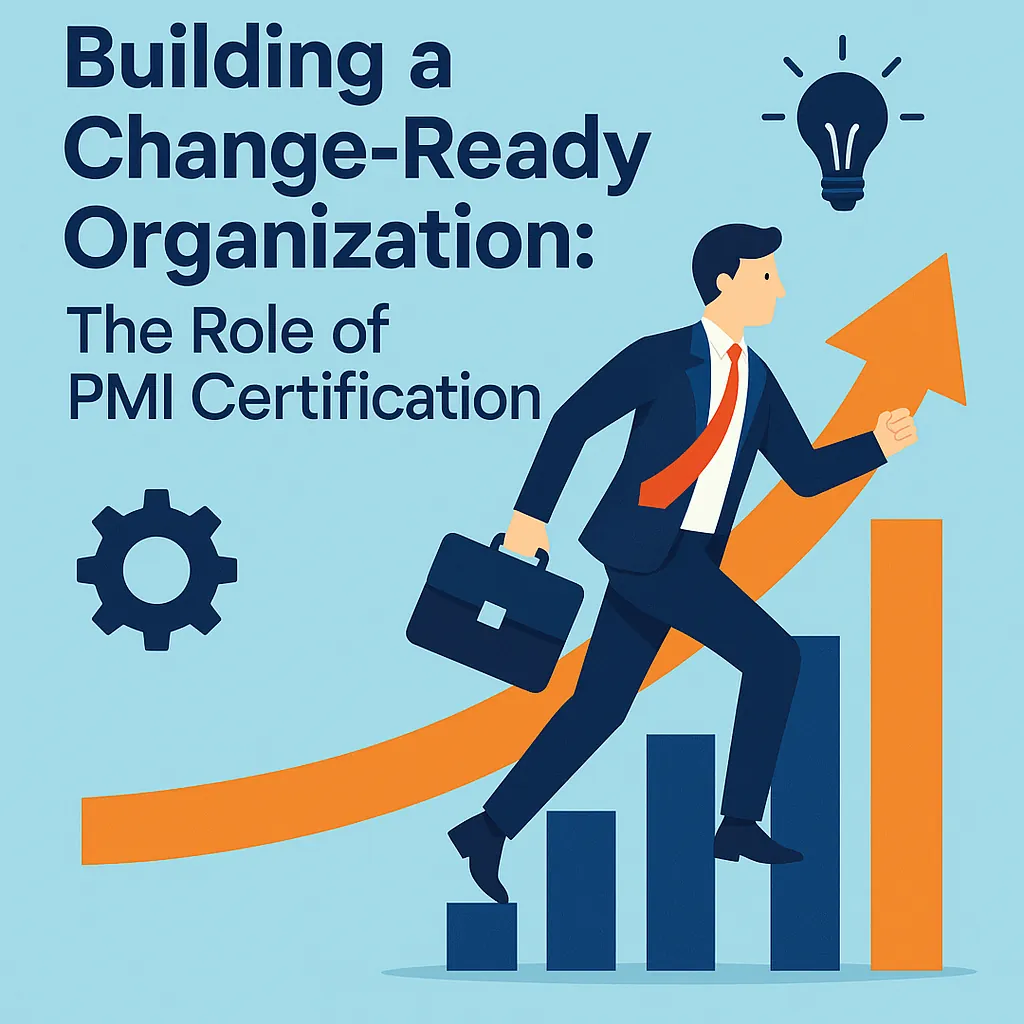Introduction to Change Management
Organizations are constantly faced with the need to adapt and evolve. This necessity has brought change management to the forefront as a critical competency for leaders and managers. Change management can be defined as the organized application of resources and processes to facilitate the successful implementation of change within an organization. It plays a vital role in ensuring that changes align with the organization’s strategic goals and are embraced by employees, ultimately leading to improved business outcomes [5].
The frequency of organizational change has significantly increased in recent years. Factors such as technological advancements, market dynamics, and evolving customer expectations compel organizations to innovate and remain agile. As a result, managing change effectively has become essential for organizations to thrive. According to the Project Management Institute (PMI), change management is increasingly recognized as an integral part of project management, portfolio management, and program management, highlighting its importance across various disciplines [1][3].
A key aspect of successful change management is the concept of change readiness. Change readiness refers to an organization’s preparedness to implement change initiatives, encompassing the willingness and ability of employees to adapt to new processes, structures, or cultures. Organizations that prioritize change readiness are more likely to achieve their desired outcomes, as they can effectively navigate the challenges that accompany change. Research indicates that organizations with a formal change management practice experience higher success rates in their change initiatives, underscoring the importance of fostering a culture that embraces change [13][6].
In this context, obtaining a change management certification, such as those offered by PMI, can equip organizational leaders and HR managers with the necessary skills and knowledge to lead change initiatives effectively. These certifications cover essential theories, frameworks, and practical tools that enable professionals to manage change successfully, ensuring that their organizations remain competitive and resilient in an ever-evolving landscape [10][14].
By understanding the significance of change management and fostering change readiness, organizations can build a robust foundation for navigating the complexities of change, ultimately leading to sustained success and growth.
Understanding Change Readiness
Change readiness is a crucial concept in the realm of organizational change management, particularly for leaders and HR managers aiming to foster a resilient and adaptable workforce. It refers to an organization’s preparedness to implement change effectively, encompassing several key components that contribute to successful transitions.
Definition and Components of Change Readiness
Change readiness can be defined as the organization’s resolve, fit, and capacity to successfully deliver the benefits of a proposed program or initiative. It involves assessing various elements, including:
- Vision and Purpose: Establishing a clear vision for the change initiative helps align the organization’s goals with the desired outcomes, ensuring that all stakeholders understand the rationale behind the change [5].
- Organizational Capacity: This includes evaluating the resources, skills, and infrastructure available to support the change process. A well-prepared organization will have the necessary tools and personnel in place to facilitate the transition [2].
- Employee Engagement: Engaging employees in the change process is vital. Their involvement can enhance buy-in and reduce resistance, making it easier to implement new strategies [11].
Impact of Change Readiness on Employee Engagement and Project Outcomes
The level of change readiness within an organization significantly influences employee engagement and the overall success of projects. When employees feel prepared and supported during transitions, they are more likely to:
- Embrace Change: A high level of readiness fosters a positive attitude towards change, encouraging employees to adopt new processes and practices willingly [9].
- Enhance Productivity: Engaged employees are typically more productive, as they understand their roles in the change process and feel motivated to contribute to its success [11].
- Achieve Desired Outcomes: Organizations that prioritize change readiness often see improved project outcomes, as the alignment between employee efforts and organizational goals leads to more effective implementation of initiatives [3].
Risks of Inadequate Change Readiness
Conversely, a lack of change readiness can pose significant risks to organizations, including:
- Resistance to Change: Employees may resist new initiatives if they feel unprepared or uncertain about the changes being implemented. This resistance can lead to delays and increased costs [11].
- Decreased Morale: Inadequate support during transitions can result in decreased employee morale, leading to disengagement and higher turnover rates [10].
- Failed Projects: Ultimately, insufficient change readiness can jeopardize the success of projects, resulting in unmet objectives and wasted resources [9].
The Role of PMI in Change Management
In today’s fast-paced business environment, organizations must be agile and innovative to thrive. The Project Management Institute (PMI) plays a pivotal role in supporting organizations in their change management initiatives, equipping leaders and HR managers with the necessary tools and frameworks to foster a change-ready culture.
Overview of PMI and Its Mission
The Project Management Institute (PMI) is a globally recognized organization dedicated to advancing the profession of project management. Its mission is to promote project management as a profession and to provide practitioners with the resources, tools, and knowledge necessary to succeed. PMI aims to enhance the effectiveness of project management practices across various industries, ensuring that organizations can adapt to change and achieve their strategic goals.
Introduction to PMI’s Change Management Framework and Methodologies
PMI has developed a comprehensive change management framework that integrates seamlessly with project management practices. This framework emphasizes the importance of aligning change initiatives with organizational strategy and includes methodologies that guide leaders through the change process. Key components of PMI’s approach include:
- Change Management Principles: PMI’s certification programs cover foundational theories and concepts of change management, including models that help organizations navigate transitions effectively [10].
- Integration with Project Management: PMI recognizes that change management is not a standalone process but is central to project management. By applying change management principles alongside project management techniques, organizations can ensure that changes are not only implemented but also sustained [14].
- Best Practices: PMI contributes to establishing best practices in change management through its research and resources. By promoting standardized techniques, PMI helps organizations achieve higher success rates in their change initiatives [12].
Emphasizing PMI’s Contribution to Establishing Best Practices in Change Management
PMI’s commitment to change management is evident in its development of guidelines and resources that support organizations in managing change effectively. The organization provides:
- Certification Programs: PMI offers change management certification that equips professionals with the skills to handle organizational change. These programs cover essential topics such as planning and executing change, stakeholder engagement, and overcoming resistance [15].
- Research and Publications: PMI regularly publishes guides and practice standards that inform the standard practices of portfolio, program, and project management, further enhancing the understanding of change management within these contexts [11].
- Community and Networking: PMI fosters a community of project management professionals who share insights and experiences related to change management, allowing organizations to learn from one another and adopt best practices.
Benefits of PMI Change Management Certification
In today’s fast-paced business environment, organizations must be agile and adaptable to thrive. The PMI Change Management Certification equips leaders with the necessary skills and knowledge to navigate and implement organizational change effectively. Here are the key benefits of obtaining this certification:
Certification Process and Requirements
The PMI Change Management Certification is designed for professionals who wish to enhance their expertise in managing change within their organizations. The certification process typically involves:
- Eligibility Criteria: Candidates are required to have a certain level of education and experience in project management or change management. This ensures that participants have a foundational understanding of the principles involved.
- Training: Participants must complete a training program that covers essential change management principles, theories, and models. This training is crucial for building a solid knowledge base.
- Examination: After completing the training, candidates must pass a comprehensive exam that tests their understanding of change management concepts and their application in real-world scenarios. This exam is designed to validate the candidate’s competency in leading change initiatives [10][11].
Skills and Knowledge Gained
Obtaining the PMI Change Management Certification provides leaders with a wealth of skills and knowledge that are essential for fostering a change-ready organization:
- Change Management Principles: Participants learn foundational theories and concepts of change management, including various models that can be applied to different organizational contexts [10].
- Strategic Planning: The certification equips leaders with the ability to develop strategic plans that align with organizational goals, ensuring that change initiatives are effectively integrated into the overall business strategy.
- Stakeholder Engagement: Leaders gain insights into how to engage and communicate with stakeholders throughout the change process, which is critical for minimizing resistance and fostering buy-in [10][11].
- Risk Management: The certification also covers risk assessment and management strategies, enabling leaders to identify potential challenges and develop mitigation plans proactively [10].
Fostering a Change-Ready Culture
One of the most significant advantages of obtaining the PMI Change Management Certification is its impact on organizational culture. Certified leaders are better equipped to:
- Promote Change Readiness: By applying the skills learned through certification, leaders can create an environment that embraces change rather than resists it. This involves fostering open communication, encouraging feedback, and involving employees in the change process [10][11].
- Build Resilience: Leaders who are certified in change management can help their organizations develop resilience, enabling teams to adapt quickly to new challenges and opportunities. This resilience is crucial for maintaining competitive advantage in a rapidly evolving market.
- Enhance Employee Engagement: A change-ready culture leads to higher employee engagement, as team members feel valued and involved in the change process. This engagement is essential for successful change implementation and long-term organizational success [10][11].
Strategies for Building a Change-Ready Organization
Organizational change readiness is crucial for success. The Project Management Institute (PMI) certification can play a significant role in equipping leaders and HR managers with the necessary skills to foster a culture of adaptability. Here are some actionable strategies to enhance change readiness within your organization:
1. Define Clear Change Objectives
- Establish a clear vision for the change initiative. This involves articulating the compelling case for change in understandable terms, which helps in aligning the team’s efforts towards a common goal [7].
- Develop a comprehensive strategy and actionable plans to achieve these objectives, ensuring that all team members understand their roles in the process [4].
2. Foster Continuous Communication
- Effective change management hinges on continuous communication. Leaders should actively engage with employees, providing updates and soliciting feedback throughout the change process [3].
- Create a culture where open dialogue is encouraged, allowing employees to voice concerns and suggestions. This not only builds trust but also enhances buy-in from stakeholders [3][9].
3. Engage Leadership and Sponsorship
- Active sponsorship from leadership is vital. Leaders should be visibly supportive of change initiatives, demonstrating commitment and enthusiasm [3][10].
- Build a coalition of sponsors who can advocate for the change, helping to influence and motivate others within the organization [7].
4. Implement Tailored Training Programs
- Training is essential for equipping employees with the skills needed to navigate change. Tailor training programs to meet the specific needs of different teams, ensuring relevance and effectiveness [3][12].
- Consider utilizing frameworks like the Prosci Methodology to structure training and support, which can provide employees with the tools and guidance necessary to adopt new processes [12].
5. Support Employees Through Transitions
- Change can be challenging, and providing support is crucial. Establish resources such as mentorship programs or counseling services to help employees cope with transitions [9].
- Encourage a culture of adaptability by recognizing and rewarding employees who embrace change, thereby reinforcing positive behaviors [9][15].
6. Leverage PMI Certification for Change Management
- PMI certification equips project and program managers with the skills to effectively drive and navigate change. Organizations that prioritize change management training are more likely to stay ahead of the competition [11].
- Encourage leaders to pursue PMI certification to enhance their understanding of change management principles and practices, which can be instrumental in fostering a change-ready culture [11].
By implementing these strategies, organizational leaders and HR managers can create an environment that not only embraces change but thrives on it. Building a change-ready organization is not just about managing transitions; it’s about cultivating a mindset that views change as an opportunity for growth and innovation.
Conclusion: The Path Forward
In today’s rapidly evolving business landscape, the significance of change management and organizational readiness cannot be overstated. Organizations that are prepared for change are better equipped to navigate the complexities of transformation, ensuring that they can adapt and thrive in the face of new challenges. Change readiness encompasses not only the financial and material resources available but also the psychological willingness of employees to embrace change. This dual focus is essential for fostering a culture that supports continuous improvement and innovation [1][2].
Leaders play a pivotal role in cultivating this readiness. By investing in PMI certification, organizational leaders and HR managers can enhance their understanding of change management principles and practices. The PMI Change Management Certification equips professionals with the necessary skills to effectively implement and manage change initiatives, aligning them with the organization’s strategic goals. This certification serves as a valuable pathway for leaders to improve their organization’s change capabilities, ensuring that they are not only prepared for change but also able to lead their teams through it successfully [15][11].
In conclusion, fostering a change-ready organization is essential for long-term success. By prioritizing change management and considering PMI certification, leaders can build a resilient workforce that is prepared to face the challenges of tomorrow.
Find out more about Shaun Stoltz https://www.shaunstoltz.com/about/.
This post was written by an AI and reviewed/edited by a human.



